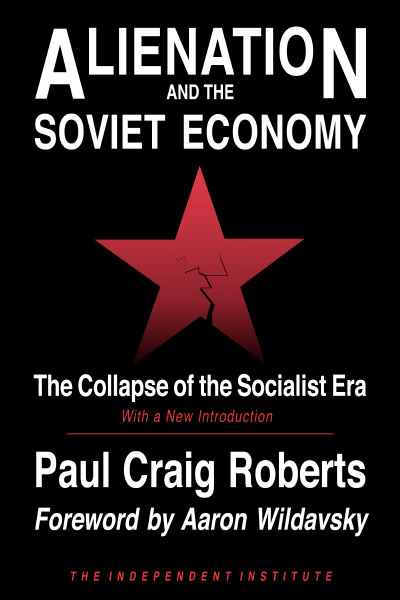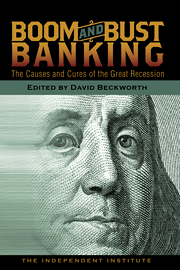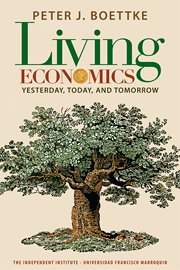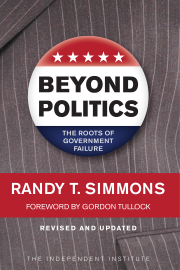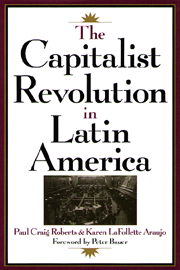| Price: | $14.40 |
| Price: | $14.40 |
Overview
In 1971, Paul Craig Roberts created a firestorm among professional Sovietologists by proclaiming that the economies of the USSR and its East Bloc allies were doomed because their “planned” economies were, in reality, anything but planned. Expanding on his original ideas, Roberts demonstrates in this book the fatal shortcomings of Marxist economies, ranging from misallocation of resources to ersatz capitalistic concepts grafted onto a system that calls for production without regard to profit. Roberts argues that the economies of the nations emerging from the USSR’s collapse must grasp the profound truths in this book if they are to become viable.
Contents
- Chapter 1: Alienation and Central Planning in Marx
- Chapter 2: “War Communism”—Product of Marxian Ideas
- Chapter 3: Polycentricity and Hierarchy
- Chapter 4: The Polycentric Soviet Economy
- Chapter 5: Oskar Lange’s Theory of Socialist Planning
- Chapter 6: Speculative Excess as a Force in History
Detailed Summary
- Socialism versus capitalism has dominated economic debate around the world for most of the twentieth century. When Alienation and the Soviet Economy first appeared two decades ago, its seminal scholarship was inconvenient for professional Sovietologists enamored of central planning. Current events however have confirmed all its most controversial conclusions about the failure of Marxist theory and the Soviet economy and make the book more timely today than when first published.
- The crumbling of Soviet-type economies was inevitable and predictable. Even before World War II, Lenin’s retreat from War Communism had demonstrated that the Marxist ideal of a fully planned economy, without any market exchange whatsoever, was a practical impossibility.
- The Soviet economy ultimately evolved into decentralized chaos. Beneath the illusion of central planning is a polycentric system of irrational signals. Soviet planners simply ask factory managers and other heads of enterprises what they intend to do, and then order them to do it.
- Despite the historical justifications of professional Sovietologists in the West, all the failures of Soviet socialism stem directly from the speculative excesses of Marxist ideology. The crimes of Lenin and Stalin were not the results of aberrant personalities or other historical coincidences but arose directly from the relentless application of Marx’ s theories.
- Polish economist Oskar Lange’s much-hailed theory of socialist planning failed utterly to salvage socialist economies. Yet ironically this unadmitted theoretical abandonment of central planning did much to undermine intellectual confidence in the efficiency of the free market.
- Alienation and the Soviet Economy is today considered by many top Russian economists as the one book that has accurately analyzed the inherent contradictions in socialism. “Unlike any other book of the last twenty years,” writes Yuri B. Kochevrin, a member of the Economic Institute, Russian Academy of Sciences, “Alienation and the Soviet Economy reveals why central planning failed. This classic book provides the intellectual bridge between our past and our future.”
We live in momentous times. As the Soviet empire collapses before our eyes, perhaps still more stunning is the spectacle of formerly Marxist nations jettisoning central planning and embracing the market. It leaves many Western academics, who sympathized with the Marxist creed or apologized for socialist experiments, looking ridiculous.
One scholar, however, stands out as a notable exception. He is Paul Craig Roberts, a Research Fellow at The Independent Institute who today holds is Chairman of the Institute for Political Economy. When his major work, Alienation and the Soviet Economy, first appeared in 1971 it was virtually ignored or dismissed by most professional Sovietologists. Yet the cascade of current events has fully vindicated all its most controversial conclusions about Marxist theory and the Soviet economy.
The Independent Institute is therefore delighted to make this seminal book accessible again to the general public. This new edition of Alienation and the Soviet Economy also features a foreword by Aaron Wildavsky, the late Professor of Political Science of the University of California at Berkeley. In addition to this English edition, a Russian translation has been published in Moscow.
Marxism Versus the Market
Very few books range from high theory to mundane practice as competently as Alienation and the Soviet Economy. This intellectual versatility allows Roberts to demonstrate how economic reality had forced Soviet leaders to permanently retreat from pure Marxism prior even to World War II.
For Karl Marx, the fundamental “evil” that socialism would eradicate was neither capitalism nor private property but commodity exchange itself. Marx felt that trading on the market, in and of itself, “alienated” workers from their labor. “The separation between producer and user bridged only by the ‘cash nexus’,” Roberts writes, “is the source of all the specific economic ills . . . attributed by Marx to capitalism.“Marx looked forward to the abolition of all monetary exchange, indeed all markets—-in consumption as well as production—and their replacement with a central plan that would turn the entire economy into one big, happy household.
Lenin and the Bolsheviks tried to impose this theoretical blueprint on Russia after seizing power in 1917. In one drastic leap into socialism, they outlawed all trade, all hiring of labor, all leasing of land, all private enterprise—in short, literally all voluntary exchange. The results were catastrophic. Production plummeted as Russia faced starvation, destruction, and death.
By 1921, Lenin found himself compelled to initiate what he called the New Economic Policy (NEP): a complete reversion to market exchange. The years before the NEP have gone down in history as War Communism. As the label implies, historians have tried to pawn off the excesses of this early period as mere expedients, forced upon the Bolsheviks by the cruel necessities of waging a grueling civil war against so many counter-revolutionary foes.
Alienation and the Soviet Economy, however, irrefragably demonstrates that Lenin and the other Bolsheviks looked upon War Communism not as some temporary expedient, but as a deliberate and calculated effort to put Marxist ideals into immediate practice. They realized that the NEP represented a serious ideological retreat. Roberts quotes Lenin as openly conceding that “the direct transition to purely socialist forms, to purely socialist distribution, was beyond our available strength.” In other words, Ludwig von Mises’s classic argument that socialism was an economic impossibility had already received dramatic empirical substantiation by 1921.
Not until 1927 had Russian economic recovery gone on long enough for Stalin to dare another leap into socialism. Under the first Five-Year Plan, land and industry were brutally collectivized. Thus, as Kenneth Boulding has pointed out, Roberts’s scholarly contributions show that “Marx leads much more directly to Stalin and the Gulag Archipelago than the more tender-minded Marxists have believed.” Nonetheless, despite Stalin’ s monstrous crimes, he was far too shrewd to contemplate another abolition of money. Unlike Lenin under War Communism, Stalin permitted the use of the ruble not only for accounting but for wages and other actual payments.
In fact, throughout the entire history of all socialist regimes, we can perhaps identify as many as three genuine efforts to adhere strictly to Marx and abolish the market totally: War Communism in Russia, Cuba under Castro during the 1960s, and Cambodia under Pol Pot and the Khmer Rouge. Each of these efforts, of course, was an utter disaster. Castro converted Cuba from a Latin American nation with one of the highest per capita incomes to one of the lowest, and little more needs to be said about the horrors of Cambodia’s Killing Fields.
The Mirage of Central Planning
If these meager three failures represent the only instances of true Marxism, what kind of socialism has held the Soviet empire and China in its grip for all these years? Here again, Alienation and the Soviet Economy is breathtakingly provocative. Roberts contends that none of these economies practice central planning at all. They merely offer an illusion of planning. As Michael Polanyi suggested in 1940, the Soviet Union really has a “disguised market economy.”
Soviet planners simply ask factory managers and other heads of enterprises what they intend to do, and then order them to do it. “The published plans,” writes Roberts, “appear to be almost entirely derived from what amounts to asking each enterprise its ex ante production plans and negotiating over percentage increases. The individual plans of each enterprise are then handed back to them with instructions to perform them.”
The planners consequently have no real control over what happens in the polycentric Soviet economy. “The plan is changed so often,” Roberts wryly adds, “that it is not congruous to say that it controls the development of the economy. There is an alternative possibility that the development of events controls the plan.”
Alienation and the Soviet Economy shows that the unacknowledged abandonment of central planning has applied not just to socialist practice but to socialist theory as well. Oskar Lange, in his famous reply to Mises, supposedly showed how central planners could engage in rational economic calculation. Others have cast suspicion on whether Lange’s so-called market socialism really solves the calculation problem. Roberts however observes that Lange’s solution, regardless of its feasibility, has nothing to do with central planning. Lange’s “planners” are dutiful slaves to resource data and market-based equilibrium equations; they give no more conscious direction to the economy than it already has without them.
Even though what Wildavsky calls “the ersatz imitation of capitalism” prevailed until recently throughout the Communist world, the imitation was not the real thing. It imposed enormous economic costs. Socialist nations may have to rely upon markets to allocate resources, but upon markets that are hampered, sabotaged, distorted, and subverted. The planners’ efforts to maintain a mirage of central control creates perverse incentives that misallocate resources on a vast scale.
“If the Soviet Union has not a centrally planned economy,” writes Roberts, “it cannot abandon central planning; what can be abandoned are efforts at central planning. These efforts at central planning have introduced non-market criteria into the role of market criteria. The result has been irrational signals for managerial interpretation, and the irrationality of production in the Soviet Union has been the consequence.”
Roberts concludes that the best way to view the Soviet economy is “as a polycentric system with signals that are irrational from the standpoint of economic efficiency.” Alienation and the Soviet Economy thereby confirms that Mises and Friedrich Hayek were more right than they realized in the socialist calculation debate. Central planning is impossible—literally. As Wildavsky recommends in his foreword, “This is the best book to read on communist political economy for those who think they already know it all.”
Praise
“Professor Roberts’ explanation of Soviet economic development is timely, and it fills a noticeable void in the existing literature. The book is beneficial reading for experts and non-experts alike who wish to understand the theoretical Marxian framework within which the Soviet economy grew and declined.”
—ZBIGNIEW BRZEZINSKI, former National Security Advisor
“Alienation and the Soviet Economy analyzes the inherent weaknesses of Soviet planning, and has been widely praised by members of the Russian Academy of Sciences.”
—THE NEW YORK TIMES
“This book of original scholarship, Alienation and the Soviet Economy, exposes the ideological origins of socialist efforts at central planning and confirms that there is no alternative to the market for a modern economy.”
—OLEG BOGOMOLOV, Director, Institute of Economics, Russian Academy of Sciences; Member, Congress of People’s Deputies
“Paul Craig Roberts, in an almost unique combination of economic expertise and common sense, has devastatingly shown not merely the inherent non-viabilities within the Soviet economy, but also how and why some supposed Western experts thought it was working fairly well.”
—ROBERT CONQUEST, author of The Great Terror and The Harvest of Sorrow; Senior Fellow, Hoover Institution, Stanford University
“The Soviet Union has done the world an immense favor by proving that economic planning cannot work. Professor Roberts has insightfully proved an account of, and intellectual reasoning for, the disaster. What better laboratory could American advocates of government control of economic activity have?”
—WALTER E. WILLIAMS, Professor of Economics, George Mason University
“Unlike any other book of the last twenty years, Alienation and the Soviet Economy reveals why socialism is a failure. Now with the proliferation of works on peristroika, Roberts’ classic book provides the intellectual bridge between our knowledge of the evils of central planning and the need for a modern market-based economy for the Soviet Union.”
—YURI B. KOCHEVRIN, Member, Economic Institute, Russian Academy of Sciences
“In this closely reasoned volume, Professor Roberts . . . effectively argues that the U.S.S.R. was not a planned economy . . . . Roberts’s book provides a valuable reinterpretation of the Soviet economy and Soviet history.”
—RUSSIAN REVIEW
“Alienation and the Soviet Economy should be used as reading for Soviet economic courses and also it is a must for every library with interests in Soviet affairs.”
—CHOICE
“Interesting observations on the functioning of contemporary Soviet and Soviet bloc economies.” —CANADIAN SLAVONIC PAPERS
“Paul Craig Roberts should be read not only in Moscow, where he is, but in Washington. Alienation and the Soviet Economy is indeed a work on target, and Aaron Wildavsky’s opening is certainly a plus, putting the entire subject in a context readily appreciated by American readers.”
—IRVING LOUIS HOROWITZ, Hannah Arendt Distinguished Professor of Sociology and Political Science, Rutgers University
“Alienation and the Soviet Economy provides a clear, forceful interpretation of the Soviet experiment.”
—JOURNAL OF ECONOMIC ISSUES
“The greatest value of Alienation and the Soviet Economy lies in the insistence that studies of the Soviet economy which focus on the process of central planning are detached from reality, and obscure, rather than advance our understanding of the system and its evolution. Fortunately, an increasing amount of research is being devoted to the development of explicitly or implicitly polycentric models of the Soviet economy, based on analyses of individual decision-making behavior. As it progresses, this work will increasingly vindicate Professor Robert’s insights into the nature of the system.”
—SLAVIC REVIEW
“The uncritical acceptance by Western observers of the supposed achievements brought about by central planning in the Soviet Union is subjected to a devastating critique in this short but powerful book . . . . Roberts notes that the true primary function of the planning bureaucracy is to direct its activities to overcoming the problems created by its own existence . . . a gem of a book.”
—NATIONAL REVIEW
“Rejecting common interpretations of the Soviet economic system, the author has produced a challenging if controversial book.”
—JOURNAL OF ECONOMIC LITERATURE
“The author’s ideas are novel and provocative, and his analysis is stimulating.”
—ECONOMIC JOURNAL
“It is easy to see that Roberts has written an extremely important and provocative book.”
—REASON
“In your theory of the polycentric organizational structure of the Soviet economy, you raise my ‘window’ to the rank of a new significant theorem, and prove in a manner which is a novelty for us how much better a view it gives for the understanding of a ‘Soviet-type’ economy.”
—TIBOR LISKA, Budapest, Hungary
“This book is appropriate for all levels of readers, including both specialists and non-specialists in the field of Soviet economics. After reading Alienation and the Soviet Economy, one student remarked that Professor Roberts was the first scholar he had ever read who explained the Soviet economy in its own terms, thus clarifying a number of problems which had previously perplexed him. Many established economists, historians, and Marxologists may prove less charitable, for Professor Roberts has defiled a whole herd of sacred cows. Even so, there is enough solid scholarshiop is this small book that its reputation will only profit from the controversy it will provoke.”
—INTERCOLLEGIATE REVIEW
“Alienation and the Soviet Economy is economic analysis in the grand manner. The book is a warning to future generations not to commit crimes in the name of socialism—to no purpose. The market rules, and presumably Marxian alienation continues to afflict us all.”
—AUSTRALIAN JOURNAL OF INTERNATIONAL AFFAIRS
“Alienation and the Soviet Economy points out with careful analysis that the root problem of the Soviet Union lay precisely in the ideas of Marx.”
—WORLD AFFAIRS REPORT
“Alienation and the Soviet Economy deserves renewed attention.”
—THE BOOKWATCH
“Alienation and the Soviet Economy is a timely and highly prescient book takes on new significance with the collapse of Soviet-style economies throughout the world. It clearly merits the serious attention of a broad spectrum of educators, policymakers and interested laymen, and deserves a place in every respectable academic library and in many public collections as well.”
—LAW BOOKS IN REVIEW
Author
Paul Craig Roberts is Chairman of the Institute for Political Economy and a nationally syndicated columnist.

